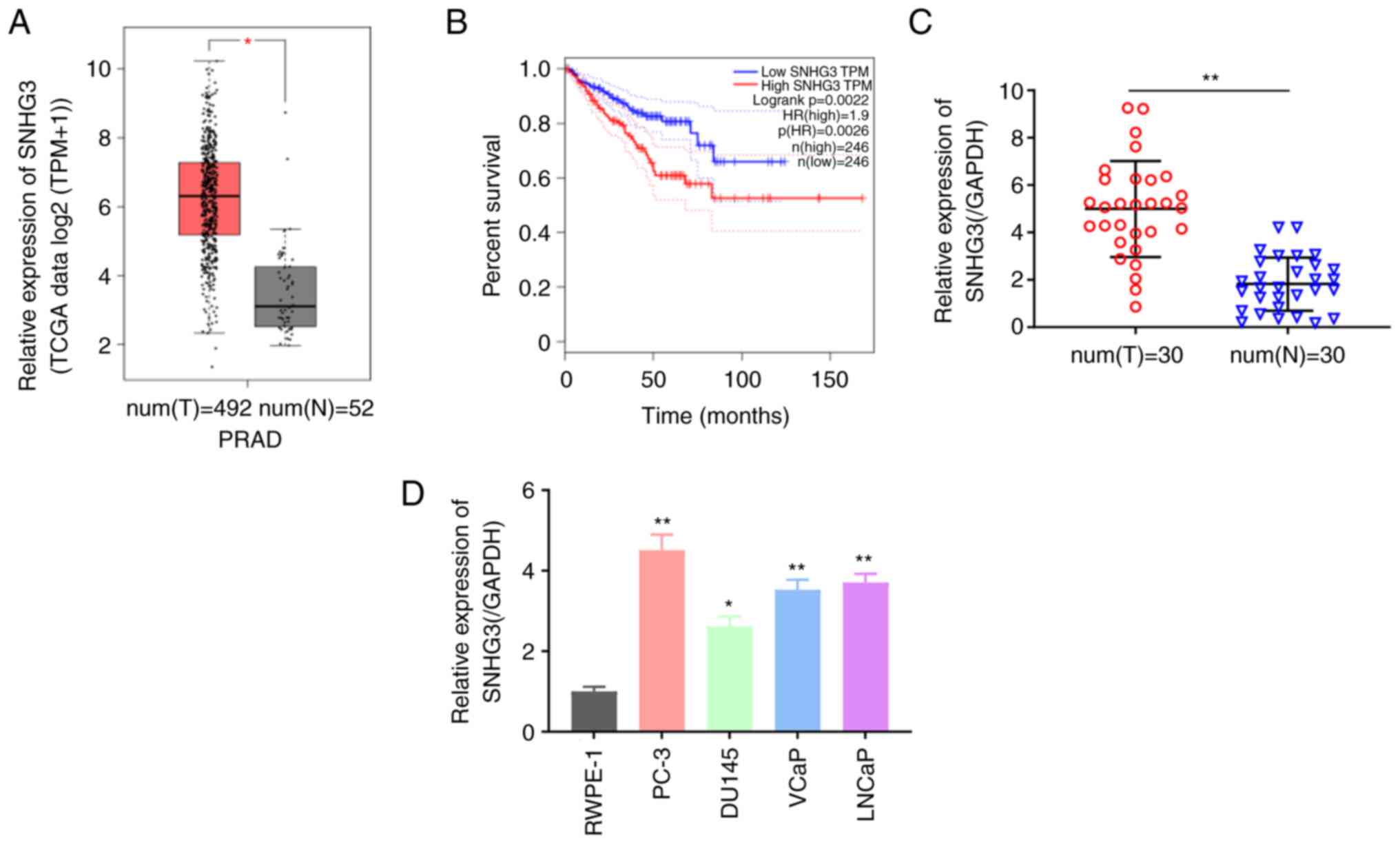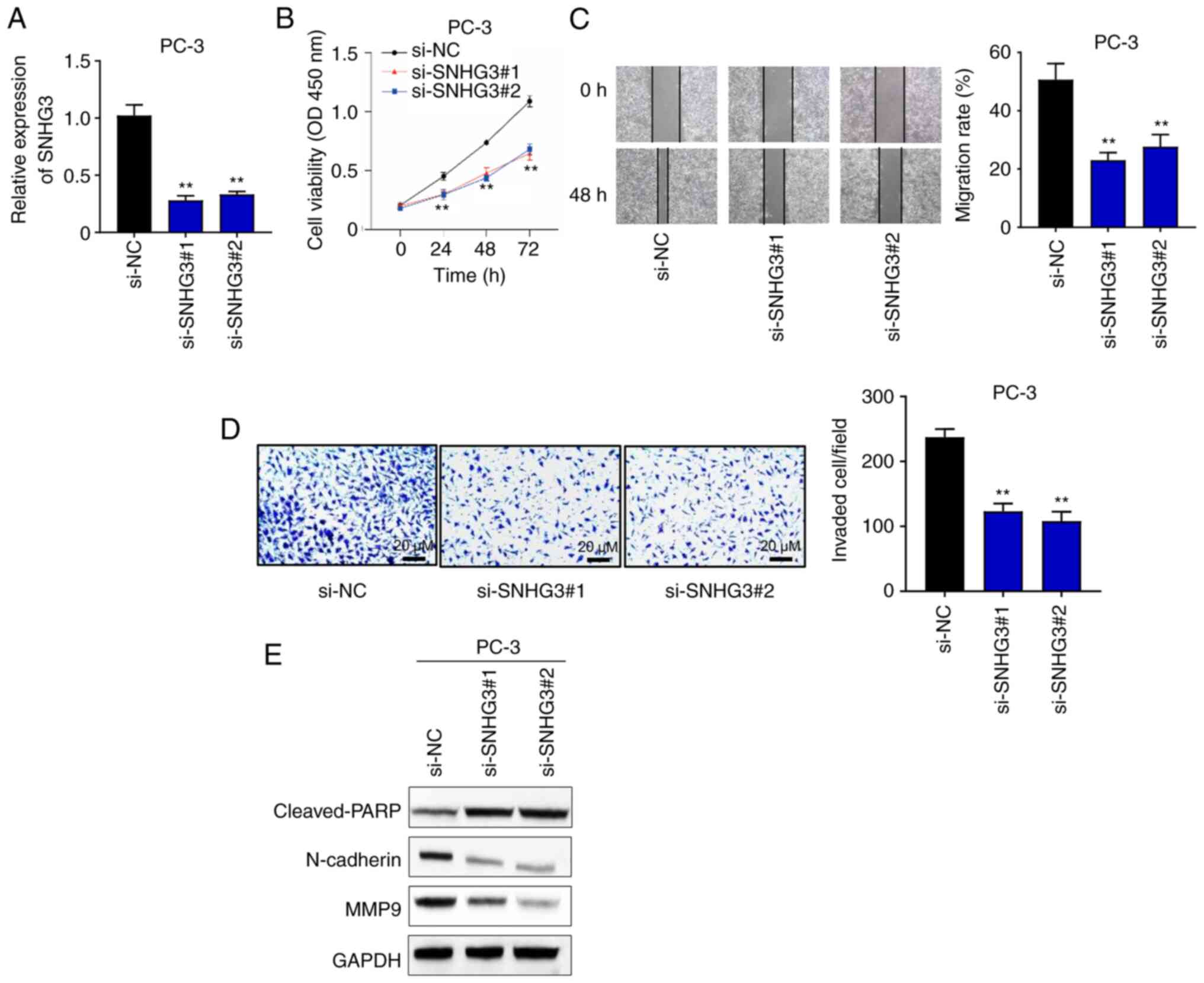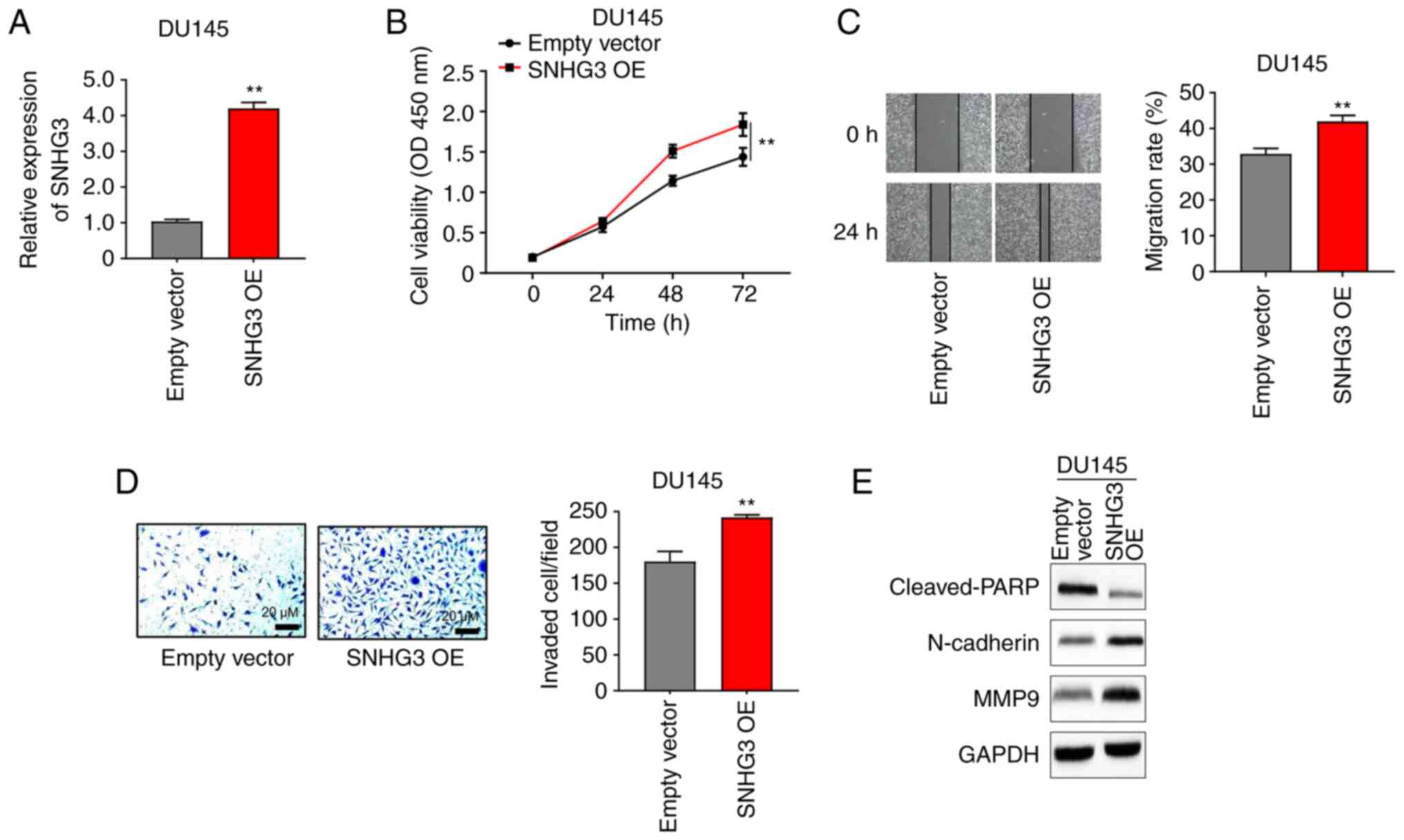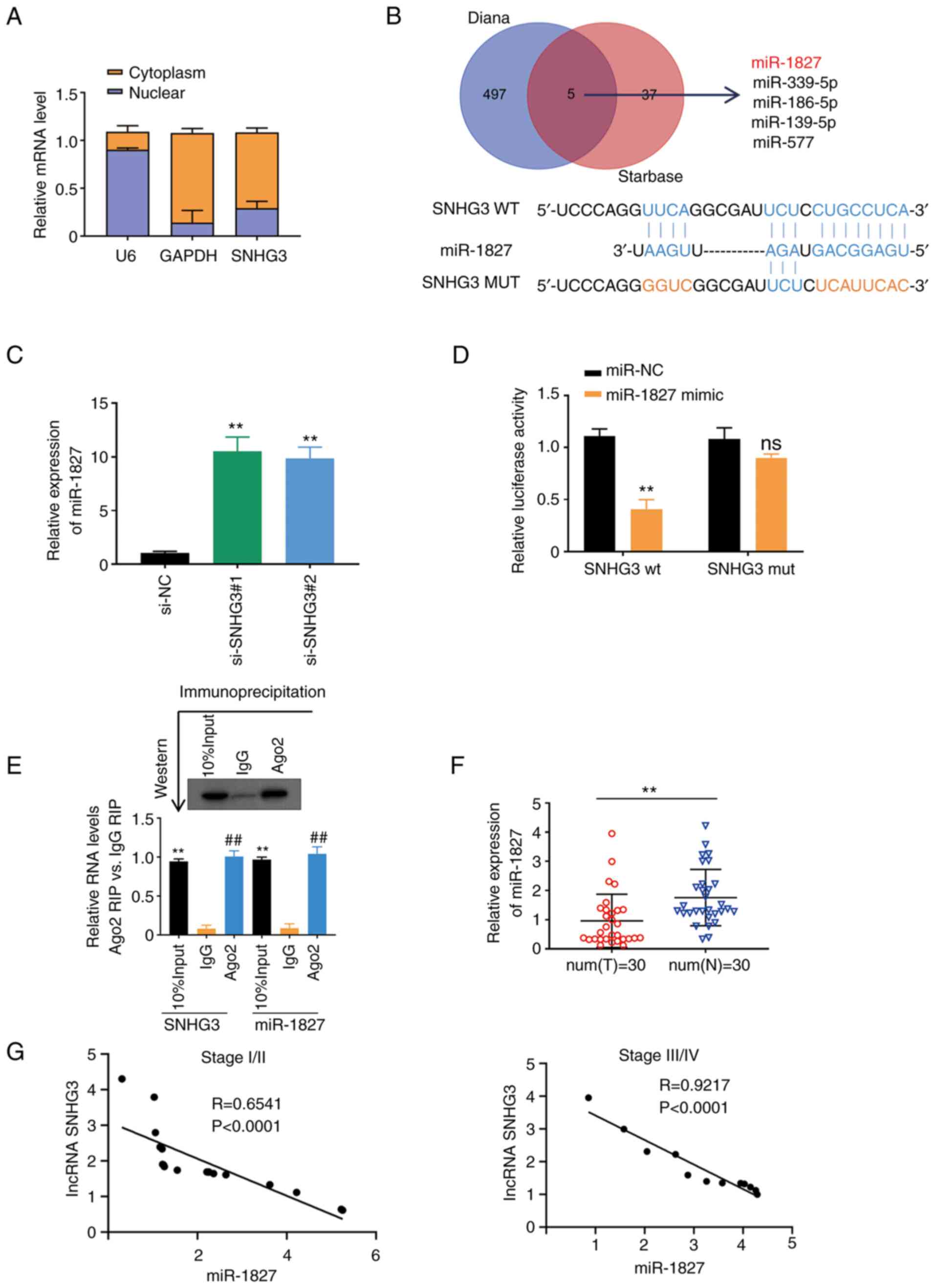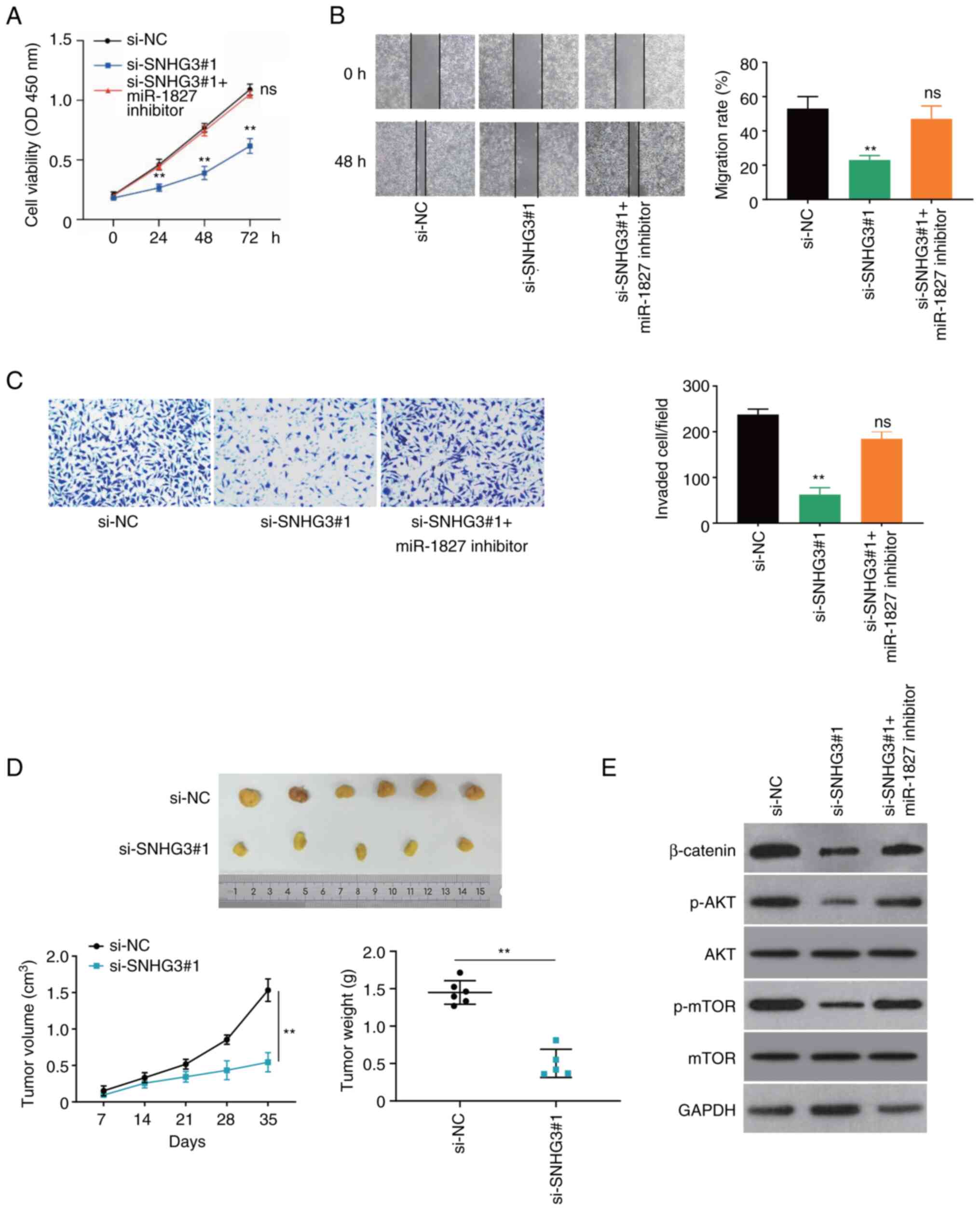|
1
|
Bray F, Ferlay J, Soerjomataram I, Siegel
RL, Torre LA and Jemal A: Global cancer statistics 2018: GLOBOCAN
estimates of incidence and mortality worldwide for 36 cancers in
185 countries. CA Cancer J Clin. 68:394–424. 2018. View Article : Google Scholar : PubMed/NCBI
|
|
2
|
Shoag JE, Nyame YA, Gulati R, Etzioni R
and Hu JC: Reconsidering the trade-offs of prostate cancer
screening. N Engl J Med. 382:2465–2468. 2020. View Article : Google Scholar : PubMed/NCBI
|
|
3
|
Schmitt AM and Chang HY: Long noncoding
RNAs in cancer pathways. Cancer Cell. 29:452–463. 2016. View Article : Google Scholar : PubMed/NCBI
|
|
4
|
Xiao G, Yao J, Kong D, Ye C, Chen R, Li L,
Zeng T, Wang L, Zhang W, Shi X, et al: The long noncoding RNA
TTTY15, which is located on the Y chromosome, promotes prostate
cancer progression by sponging let-7. Eur Urol. 76:315–326. 2019.
View Article : Google Scholar : PubMed/NCBI
|
|
5
|
Profumo V, Forte B, Percio S, Rotundo F,
Doldi V, Ferrari E, Fenderico N, Dugo M, Romagnoli D, Benelli M, et
al: LEADeR role of miR-205 host gene as long noncoding RNA in
prostate basal cell differentiation. Nat Commun. 10:3072019.
View Article : Google Scholar : PubMed/NCBI
|
|
6
|
Zhang C, Wang GX, Fu B, Zhou XC, Li Y and
Li YY: LncRNA CASC15 promotes migration and invasion in prostate
cancer via targeting miR-200a-3p. Eur Rev Med Pharmacol Sci.
24:72152020.PubMed/NCBI
|
|
7
|
Jiang Z, Zhang Y, Chen X, Wu P and Chen D:
Long non-coding RNA LINC00673 silencing inhibits proliferation and
drug resistance of prostate cancer cells via decreasing KLF4
promoter methylation. J Cell Mol Med. 24:1878–1892. 2020.
View Article : Google Scholar : PubMed/NCBI
|
|
8
|
Zhang W, Shi X, Chen R, Zhu Y, Peng S,
Chang Y, Nian X, Xiao G, Fang Z, Li Y, et al: Novel long non-coding
RNA lncAMPC promotes metastasis and immunosuppression in prostate
cancer by stimulating LIF/LIFR expression. Mol Ther. 28:2473–2487.
2020. View Article : Google Scholar : PubMed/NCBI
|
|
9
|
Wu X, Xiao Y, Zhou Y, Zhou Z and Yan W:
LncRNA FOXP4-AS1 is activated by PAX5 and promotes the growth of
prostate cancer by sequestering miR-3184-5p to upregulate FOXP4.
Cell Death Dis. 10:4722019. View Article : Google Scholar : PubMed/NCBI
|
|
10
|
Li JB, Liu F, Zhang BP, Bai WK, Cheng W,
Zhang YH and Yu LJ: LncRNA625 modulates prostate cancer cells
proliferation and apoptosis through regulating the Wnt/β-catenin
pathway by targeting miR-432. Eur Rev Med Pharmacol Sci.
21:2586–2595. 2017.PubMed/NCBI
|
|
11
|
Dai G, Huang C, Yang J, Jin L, Fu K, Yuan
F, Zhu J and Xue B: LncRNA SNHG3 promotes bladder cancer
proliferation and metastasis through miR-515-5p/GINS2 axis. J Cell
Mol Med. 24:9231–9243. 2020. View Article : Google Scholar : PubMed/NCBI
|
|
12
|
Duan Y, Wang Z, Xu L, Sun L, Song H, Yin H
and He F: lncRNA SNHG3 acts as a novel tumor suppressor and
regulates tumor proliferation and metastasis via AKT/mTOR/ERK
pathway in papillary thyroid carcinoma. J Cancer. 11:3492–3501.
2020. View Article : Google Scholar : PubMed/NCBI
|
|
13
|
Fei F, He Y, He S, He Z, Wang Y, Wu G and
Li M: LncRNA SNHG3 enhances the malignant progress of glioma
through silencing KLF2 and p21. Biosci Rep. 38:BSR201804202018.
View Article : Google Scholar : PubMed/NCBI
|
|
14
|
Li T, Xing Y, Yang F, Sun Y, Zhang S, Wang
Q and Zhang W: LncRNA SNHG3 sponges miR-577 to up-regulate SMURF1
expression in prostate cancer. Cancer Med. 9:3852–3862. 2020.
View Article : Google Scholar : PubMed/NCBI
|
|
15
|
Dacheng W, Songhe L, Weidong J, Shutao Z,
Jingjing L and Jiaming Z: LncRNA SNHG3 promotes the growth and
metastasis of colorectal cancer by regulating miR-539/RUNX2 axis.
Biomed Pharmacother. 125:1100392020. View Article : Google Scholar : PubMed/NCBI
|
|
16
|
Mocellin S, Rossi CR, Pilati P, Nitti D
and Marincola FM: Quantitative real-time PCR: A powerful ally in
cancer research. Trends Mol Med. 9:189–195. 2003. View Article : Google Scholar : PubMed/NCBI
|
|
17
|
Cheng L, Montironi R, Bostwick DG,
Lopez-Beltran A and Berney DM: Staging of prostate cancer.
Histopathology. 60:87–117. 2012. View Article : Google Scholar : PubMed/NCBI
|
|
18
|
Arisi I, D'Onofrio M, Brandi R, Felsani A,
Capsoni S, Drovandi G, Felici G, Weitschek E, Bertolazzi P and
Cattaneo A: Gene expression biomarkers in the brain of a mouse
model for Alzheimer's disease: Mining of microarray data by logic
classification and feature selection. J Alzheimers Dis. 24:721–738.
2011. View Article : Google Scholar : PubMed/NCBI
|
|
19
|
Yu L and Ren Y: Long noncoding RNA small
nucleolar RNA host gene 3 mediates prostate cancer migration,
invasion, and epithelial-mesenchymal transition by sponging
miR-487a-3p to regulate TRIM25. Cancer Biother Radiopharm. Jan
7–2021.(Epub ahead of print). View Article : Google Scholar
|
|
20
|
Gong X and Ning B: Five lncRNAs associated
with prostate cancer prognosis identified by coexpression network
analysis. Technol Cancer Res Treat. 19:15330338209635782020.
View Article : Google Scholar : PubMed/NCBI
|
|
21
|
Thomson DW and Dinger ME: Endogenous
microRNA sponges: Evidence and controversy. Nat Rev Genet.
17:272–283. 2016. View Article : Google Scholar : PubMed/NCBI
|
|
22
|
Fasihi A, B MS, Atashi A and Nasiri S:
Introduction of hsa-miR-103a and hsa-miR-1827 and hsa-miR-137 as
new regulators of Wnt signaling pathway and their relation to
colorectal carcinoma. J Cell Biochem. 119:5104–5117. 2018.
View Article : Google Scholar : PubMed/NCBI
|
|
23
|
Ho CS, Noor SM and Nagoor NH: MiR-378 and
MiR-1827 regulate tumor invasion, migration and angiogenesis in
human lung adenocarcinoma by targeting RBX1 and CRKL, respectively.
J Cancer. 9:331–345. 2018. View Article : Google Scholar : PubMed/NCBI
|















